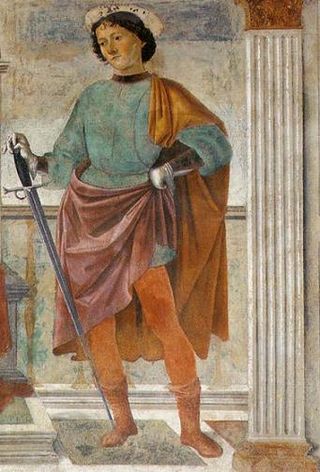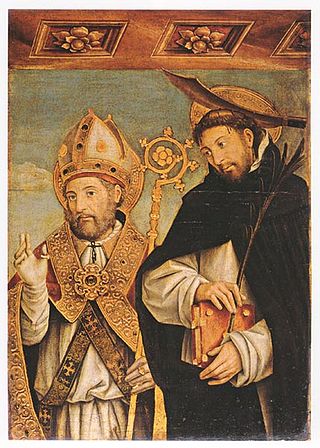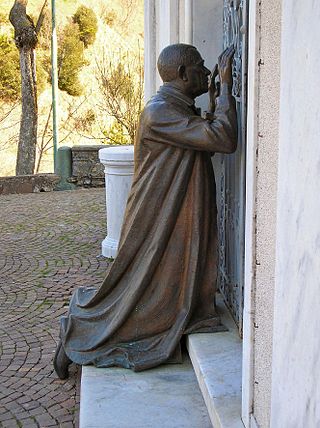
Pope Callixtus I, also called Callistus I, was the bishop of Rome from c. 218 to his death c. 222 or 223. He lived during the reigns of the Roman emperors Elagabalus and Alexander Severus. Eusebius and the Liberian catalogue list his episcopate as having lasted five years (217–222). In 217, when Callixtus followed Zephyrinus as Bishop of Rome, he started to admit into the Church converts from sects or schisms. He was martyred for his Christian faith and is venerated as a saint by the Catholic Church.
Pope Stephen I was the Bishop of Rome from 12 May 254 to his death on 2 August 257. He was later canonized as a saint and some accounts say he was martyred while celebrating Mass.

Asti is a comune of 74,348 inhabitants (1-1-2021) located in the Piedmont region of northwestern Italy, about 55 kilometres east of Turin in the plain of the Tanaro River. It is the capital of the province of Asti and it is deemed to be the modern capital of Montferrat.

Saint Valentine was a 3rd-century Roman saint, commemorated in Western Christianity on February 14 and in Eastern Orthodoxy on July 6. From the High Middle Ages, his Saints' Day has been associated with a tradition of courtly love. He is also a patron saint of Terni, epilepsy and beekeepers. Saint Valentine was a clergyman – either a priest or a bishop – in the Roman Empire who ministered to persecuted Christians. He was martyred and his body buried on the Via Flaminia on February 14, which has been observed as the Feast of Saint Valentine since at least the eighth century.

Erasmus of Formia, also known as Saint Elmo, was a Christian saint and martyr. He is venerated as the patron saint of sailors and abdominal pain. Erasmus or Elmo is also one of the Fourteen Holy Helpers, saintly figures of Christian religion who are venerated especially as intercessors.

Tortona is a comune of Piemonte, in the Province of Alessandria, Italy. Tortona is sited on the right bank of the Scrivia between the plain of Marengo and the foothills of the Ligurian Apennines. Its frazione of Vho is a member of the I Borghi più belli d'Italia association.

Zeno of Verona was either an early Christian Bishop of Verona or a martyr. He is a saint in the Catholic Church and in the Orthodox Church.

Saint Juliana of Nicomedia is said to have suffered Christian martyrdom during the Diocletianic persecution in 304. She was popular in the Middle Ages, especially in the Netherlands, as the patron saint of sickness.

Julian the Hospitaller is a Roman Catholic saint, and the patron of the cities of Ghent (Belgium), Saint Julians (Malta) and Macerata (Italy).

San Marzano Oliveto is a comune (municipality) in the Province of Asti in the Italian region Piedmont, located about 60 kilometres (37 mi) southeast of Turin and about 20 kilometres (12 mi) southeast of Asti.

Secundus of Asti is venerated as a martyr and saint. His feast day is generally celebrated on March 29. Until the 15th century it was celebrated at Asti on March 30, but it is now celebrated there on the first Tuesday in May. He was a historical figure who was beheaded at Asti under Hadrian. He is said to have been a patrician of Asti and a subaltern officer in the imperial army. It is known that a church was dedicated to him in the area as early as the 9th century.

Saint Evasius is believed to have been a missionary and bishop of Asti, in north-west Italy. He was forced to flee to the great Padan forest known as the Selva Cornea, where he and numerous followers were beheaded by pagan, or alternatively by Arian enemies, in the area of what is now Casale Monferrato. He is venerated as a saint of the Roman Catholic Church and is the patron of a number of towns in Piedmont and Lombardy. His cult is liveliest at Casale, where his remains are conserved in the cathedral dedicated to him.

Saint Emygdius was a Christian bishop who is venerated as a martyr. Tradition states that he was killed during the persecution of Diocletian.

Calimerius was an early bishop of Milan. He is honoured as a Saint in the Catholic and Eastern Orthodox churches and his feast day is on July 31.

The Diocese of Tortona is a Latin Church ecclesiastical territory or diocese of the Catholic Church in Northern Italy, spanning parts of three regions of Piedmont, Lombardy and Liguria. It is a suffragan diocese in the ecclesiastical province of the metropolitan Archdiocese of Genoa and forms part of the ecclesiastical region of Liguria. The diocese claims to be one of the oldest in Lombardy and the Piedmont.
Marcian most often refers to Flavius Marcianus, Eastern Roman emperor from 450 to 457 AD

Saint Donatus of Arezzo is the patron saint of Arezzo, and considered a bishop of the city.

Luigi Giovanni Orione was an Italian priest who was active in answering the social needs of his nation as it faced the social upheavals of the late 19th century. To this end, he founded a religious institute of men. He has been declared a saint by the Catholic Church.

Vigilius of Trent is venerated as the patron saint and bishop of Trent. He should not be confused with the pope of the same name.

Asti Cathedral, the episcopal seat of the Diocese of Asti, is a Roman Catholic cathedral in Asti, Piedmont, Italy. It is dedicated to the Assumption of the Blessed Virgin Mary and to Saint Gotthard, and at 82m long and 24m in height and width, is one of the largest churches in Piedmont, the highest expression of Gothic architecture of the region, and among the best examples of Lombard Romanesque appreciable in northern Italy.


















